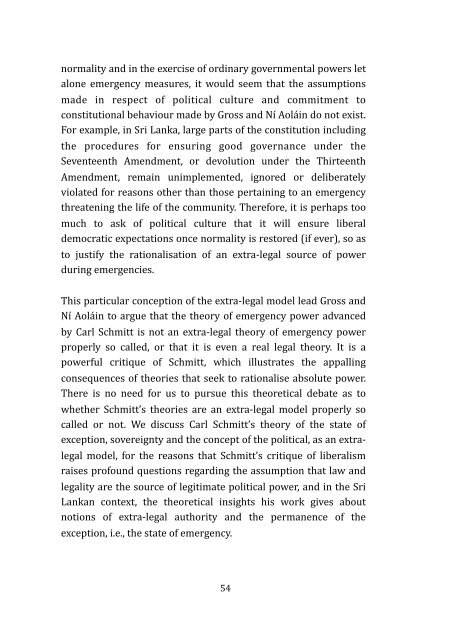States of Emergency - Centre for Policy Alternatives
States of Emergency - Centre for Policy Alternatives
States of Emergency - Centre for Policy Alternatives
Create successful ePaper yourself
Turn your PDF publications into a flip-book with our unique Google optimized e-Paper software.
normality and in the exercise <strong>of</strong> ordinary governmental powers let<br />
alone emergency measures, it would seem that the assumptions<br />
made in respect <strong>of</strong> political culture and commitment to<br />
constitutional behaviour made by Gross and Ní Aoláin do not exist.<br />
For example, in Sri Lanka, large parts <strong>of</strong> the constitution including<br />
the procedures <strong>for</strong> ensuring good governance under the<br />
Seventeenth Amendment, or devolution under the Thirteenth<br />
Amendment, remain unimplemented, ignored or deliberately<br />
violated <strong>for</strong> reasons other than those pertaining to an emergency<br />
threatening the life <strong>of</strong> the community. There<strong>for</strong>e, it is perhaps too<br />
much to ask <strong>of</strong> political culture that it will ensure liberal<br />
democratic expectations once normality is restored (if ever), so as<br />
to justify the rationalisation <strong>of</strong> an extra‐legal source <strong>of</strong> power<br />
during emergencies.<br />
This particular conception <strong>of</strong> the extra‐legal model lead Gross and<br />
Ní Aoláin to argue that the theory <strong>of</strong> emergency power advanced<br />
by Carl Schmitt is not an extra‐legal theory <strong>of</strong> emergency power<br />
properly so called, or that it is even a real legal theory. It is a<br />
powerful critique <strong>of</strong> Schmitt, which illustrates the appalling<br />
consequences <strong>of</strong> theories that seek to rationalise absolute power.<br />
There is no need <strong>for</strong> us to pursue this theoretical debate as to<br />
whether Schmitt’s theories are an extra‐legal model properly so<br />
called or not. We discuss Carl Schmitt’s theory <strong>of</strong> the state <strong>of</strong><br />
exception, sovereignty and the concept <strong>of</strong> the political, as an extralegal<br />
model, <strong>for</strong> the reasons that Schmitt’s critique <strong>of</strong> liberalism<br />
raises pr<strong>of</strong>ound questions regarding the assumption that law and<br />
legality are the source <strong>of</strong> legitimate political power, and in the Sri<br />
Lankan context, the theoretical insights his work gives about<br />
notions <strong>of</strong> extra‐legal authority and the permanence <strong>of</strong> the<br />
exception, i.e., the state <strong>of</strong> emergency.<br />
54











